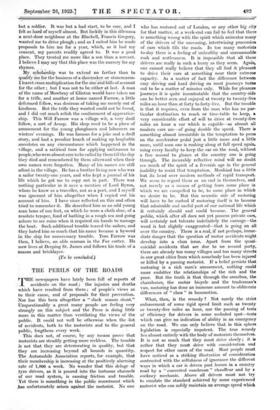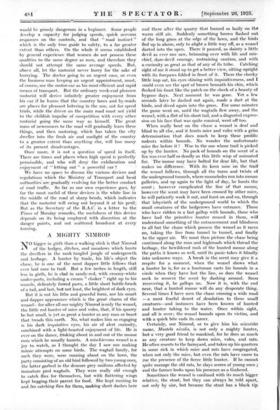THE PERILS OF THE ROADS
TAE- newspapers have lately been full of reports of accidents- on the road ; the injuries and deaths which have resulted from them ; of people's views as to their cause, and of proposals for their prevention. Nor has this been altogether a " slack season stunt." Unquestionably a great many people are feeling very strongly on this subject and the Press is doing little more in this matter than ventilating the views of the public. It could not well be otherwise when the -list of accidents, both to the motorists and to the general public, lengthens every week.
This does not, of course, by any means prove that motorists are steadily getting more reckless. The trouble is not that they are deteriorating in quality, but that they are increasing beyond all bounds in quantity. The Automobile Association reports, for example, that their membership is increasing at the positively alarming rate of 1,800 a week. No wonder that this deluge of , tyro drivers, as it is poured into the tortuous channels of our road system, is causing friction and trouble. ' Yet there is something in the public resentment which .has unfortunately arisen -against the motorist. No one who has motored out of London, or any other big city for that matter, at a week-end can fail to feel that there is something wrong with-the spirit which animates many of the drivers. of the unceasing, intertwining procession of cars which fills the roads. In too many motorists to-day there is a feeling of unhealthy and unreasonable rush and restlessness. It is impossible that all these drivers. are really in such a hurry as they seem. Again, one cannot really believe that they all find it pleasant to drive their cars at something near their extreme capacity. As a matter of fact the difference between easy driving and hard driving on most journeys turns out to be a matter of minutes only. While for pleasure journeys it is quite incontestable that the country-side can be better seen and enjoyed at twenty to twenty-five miles an hour than at forty to forty-five. But the trouble is that it requires, even from the man who has no par- ticular destination to reach or time-table to keep, a very considerable effort of will to drive at twenty-five miles an hour a car which is capable—as almost all modern cars are—of going double the speed. There is something almost irresistible in the temptation to press on the .accelerator pedal just a little more and a little more, until soon one is rushing along at full speed again, using every faculty to keep the car on the road, without a free second to glance at the country one is going through. The incurably reflective mind will no doubt see much of the spirit of a feverish age in the general inability to resist that temptation.. Mankind has a little lost its head over modern methods of rapid transport. We seem to regard them as an end in themselves, and not merely as a means of getting from some place- in which we are compelled to be, to . some place in which we desire to be. But this neurotic side of motoring will have to be curbed if motoring itself is to become that admirable and useful part of our national life which it certainly , should and could become. The general public, which after all does not yet possess private cars, will certainly not tolerate indefinitely the carnage—the word is but slightly exaggerated—that is going on all over the country. There is-a real, if not perhaps, imme- diate danger that the question of motor accidents might develop into a class issue. Apart from the quasi- suicidal accidents that are due to no second party, there are already too many villages and too many streets in our great cities from which somebody has been injured or killed by a passing motorist. If a belief persists that motoring is a rich man's amusement, nothing could more embitter the relationships of the rich and the poor. But the truth is that through the omnibus, the charabanes, the motor bicycle and the tradesman's van, motoring has done an immense amount to obliterate differences of " class " in locomotion.
What, then, is the remedy ? Not surely the strict enforcement of some rigid speed limit such as twenty or twenty-five miles an hour, nor the passing of tests of efficiency for drivers in some secluded spot—tests which can give no indication of ability in an emergency on the road. We can only believe that in this sphere legislation is especially impotent. The true remedy lies almost entirely with the body of motorists themselves. It is not so much that they must drive slowly ; it is rather that they must drive with consideration and respect for other users of the road. Most people must have noticed as a striking illustration of consideration contrasted with the selfishness of ignorance the different ways in which a car is driven past horses in a country road by a " converted coachman " chauffeur and by a cockney mechanic. Above all drivers must not try to emulate the standard achieved by some experienced motorist who can safely maintain an average speed which would be grossly dangerous in a beginner. Some people develop a capacity for judging speeds, quick- nervous responses on the controls, and that "road instinct " which is the only true guide to safety, to a far greater extent than others. On the whole it seems established by general experience that women do not possess these qualities to the same degree as men, and therefore they should not attempt the same average speeds. But, above all, let the motorist never hurry for the sake of hurrying. The doctor going to an urgent case, or even the business man keeping an urgent appointment, must, of course, use the motor-car as his most efficient and rapid means of transport. But the ordinary week-end pleasure motorist will derive infinitely greater enjoyment from hiS car if he learns that the country lanes and by-roads are places for pleasant loitering in the sun, not for speed trials, while the driver on the main road must not yield to the childish impulse of competition with every other motorist going the same way as himself. The great mass of newcomers to- the road will gradually learn these things, and then motoring, which has taken the city dweller into the fresh air and sunlight of the country to a greater extent than anything else, will lose • many of its present disadvantages.
Once more it is not a question of speed in itself. There are times and places when high speed is perfectly permissible, and who will deny the exhilaration and enjoyment of " letting out "; a powerffil car ?
We have no space to discuss the various devices and regulations which the Ministry of Transport and local authorities are gradually evolving for the better eonduct of road traffic. So far as our own experience goeS, by far the most useful of these devices is the white line in the middle of the road at sharp bends, which indicates that the motorist will swing out beyond it at his peril; But as the Secretary of the R.A.C. in a letter to the Times of Monday remarks, the usefulness of this device depends on its being employed with discretion at the danger points, and not scattered brOadeast at every turning. -



















































 Previous page
Previous page